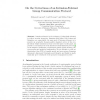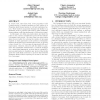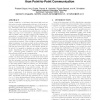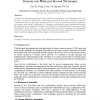10 search results - page 2 / 2 » On the composition of authenticated byzantine agreement |
CHARME
2003
Springer
13 years 10 months ago
2003
Springer
Intrusion-tolerance is the technique of using fault-tolerance to achieve security properties. Assuming that faults, both benign and Byzantine, are unavoidable, the main goal of Int...
PODC
2012
ACM
11 years 8 months ago
2012
ACM
In recent years, there have been a few proposals to add a small amount of trusted hardware at each replica in a Byzantine fault tolerant system to cut back replication factors. Th...
PODC
2009
ACM
14 years 6 months ago
2009
ACM
Global consistency or Byzantine Agreement (BA) and reliable point-to-point communication are two of the most important and well-studied problems in distributed computing. Informal...
ASIAN
2006
Springer
13 years 9 months ago
2006
Springer
We present formal proof rules for inductive reasoning about the way that data transmitted on the network remains secret from a malicious attacker. Extending a compositional protoco...
CORR
2010
Springer
13 years 3 months ago
2010
Springer
Traditional key management techniques, such as public key cryptography or key distribution center (e.g., Kerberos), are often not effective for wireless sensor networks for the se...




